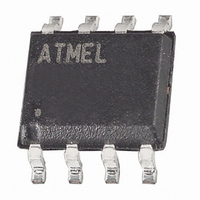AT24C01BN-SH-B Atmel, AT24C01BN-SH-B Datasheet - Page 6

AT24C01BN-SH-B
Manufacturer Part Number
AT24C01BN-SH-B
Description
IC EEPROM 1KBIT 1MHZ 8SOIC
Manufacturer
Atmel
Specifications of AT24C01BN-SH-B
Format - Memory
EEPROMs - Serial
Memory Type
EEPROM
Memory Size
1K (128 x 8)
Speed
400kHz, 1MHz
Interface
I²C, 2-Wire Serial
Voltage - Supply
1.8 V ~ 5.5 V
Operating Temperature
-40°C ~ 85°C
Package / Case
8-SOIC (3.9mm Width)
Organization
128 K x 8
Interface Type
2-Wire
Maximum Clock Frequency
1 MHz
Access Time
550 ns
Supply Voltage (max)
5.5 V
Supply Voltage (min)
1.8 V
Maximum Operating Current
3 mA
Maximum Operating Temperature
+ 85 C
Mounting Style
SMD/SMT
Minimum Operating Temperature
- 40 C
Operating Supply Voltage
1.8 V, 5.5 V
Memory Configuration
128 X 8
Clock Frequency
1MHz
Supply Voltage Range
1.8V To 5.5V
Memory Case Style
SOIC
No. Of Pins
8
Rohs Compliant
Yes
Lead Free Status / RoHS Status
Lead free / RoHS Compliant
3. Device Operation
6
SCL
SDA
AT24C01B
Start bit
CLOCK and DATA TRANSITIONS: The SDA pin is normally pulled high with an external
device. Data on the SDA pin may change only during SCL low time periods (see
page
below.
START CONDITION: A high-to-low transition of SDA with SCL high is a start condition which
must precede any other command (see
STOP CONDITION: A low-to-high transition of SDA with SCL high is a stop condition. After a
read sequence, the stop command will place the EEPROM in a standby power mode (see
ure 5-3 on page
ACKNOWLEDGE: All addresses and data words are serially transmitted to and from the
EEPROM in 8-bit words. The EEPROM sends a zero to acknowledge that it has received each
word. This happens during the ninth clock cycle.
STANDBY MODE: The AT24C01B features a low-power standby mode which is enabled: (a)
upon power-up and (b) after the receipt of the STOP bit and the completion of any internal
operations.
2-WIRE SOFTWARE RESET: After an interruption in protocol, power loss or system reset, any
2-wire part can be protocol reset by following these steps: (a) Create a start bit condition, (b)
Clock 9 cycles, (c) Create another start bit followed by a stop bit condition as shown below. The
device is ready for next communication after above steps have been completed.
1
8). Data changes during SCL high periods will indicate a start or stop condition as defined
2
8).
Dummy Clock Cycles
3
Figure 5-3 on page
8
9
8).
Start bit
5156E–SEEPR–10/08
Stop bit
Figure 5-2 on
Fig-

















